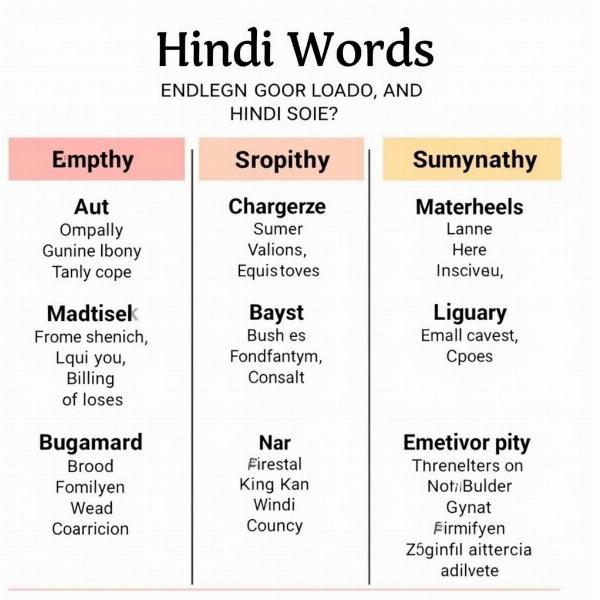Understanding the nuances of expressing pity in Hindi can be tricky. “I feel pity on you” isn’t a direct translation, and using the wrong phrase can sound awkward or even offensive. This article explores the various ways to convey pity in Hindi, considering cultural context and appropriate usage. We’ll delve into the subtleties of each expression, ensuring you choose the right words to express your sympathy genuinely and respectfully.
Exploring Hindi Equivalents of “I Feel Pity On You”
While there’s no single perfect equivalent, several Hindi phrases capture the essence of “I feel pity on you.” The most common include “mujhe tum par daya aa rahi hai” (मुझे तुम पर दया आ रही है) and “mujhe tumhare liye taras aa raha hai” (मुझे तुम्हारे लिए तरस आ रहा है). However, these phrases can sometimes carry a condescending tone. A more empathetic approach might involve saying “mujhe tumhari sthiti par dukh ho raha hai” (मुझे तुम्हारी स्थिति पर दुख हो रहा है), which translates to “I feel sad about your situation.” This expresses concern without implying superiority. Choosing the appropriate phrase depends heavily on the context and your relationship with the person.
Choosing the Right Words: Context and Nuances
The social dynamics between individuals play a crucial role in choosing the right expression. When speaking to someone older or someone you respect, using “daya” (दया) can be perceived as disrespectful. Opting for “dukh” (दुख) or expressing concern about their situation is generally more appropriate. Similarly, the severity of the situation dictates the choice of words. For minor inconveniences, a simple “kya afsos” (क्या अफ़सोस), meaning “what a pity,” suffices. However, for significant hardships, a more heartfelt expression like “main tumhare dard ko samajh sakta/sakti hun” (मैं तुम्हारे दर्द को समझ सकता/सकती हूँ), meaning “I can understand your pain,” would be more fitting.
 Various Hindi Expressions of Sympathy
Various Hindi Expressions of Sympathy
Beyond Direct Translations: Expressing Empathy in Hindi
Sometimes, actions speak louder than words. Offering practical help or simply listening attentively can be more powerful than any direct translation of “I feel pity on you.” Indian culture emphasizes empathy and support within communities. Therefore, offering assistance or simply being present for someone in need can convey genuine concern more effectively. Asking “kya main kuch madad kar sakta/sakti hun?” (क्या मैं कुछ मदद कर सकता/सकती हूँ?), meaning “Can I help in any way?”, demonstrates a willingness to go beyond mere words and provide tangible support.
Conclusion
Expressing pity in Hindi goes beyond simple translations. It requires understanding the nuances of the language and the cultural context. While phrases like “mujhe tum par daya aa rahi hai” exist, choosing more empathetic and situationally appropriate expressions is crucial. Remember, offering genuine support and understanding often transcends the limitations of language. By considering the context, relationship, and severity of the situation, you can express your sympathy sincerely and respectfully in Hindi.
FAQ
- Is “daya” always a bad word to use? Not necessarily, but it can be perceived as condescending depending on the context and your relationship with the person.
- What’s a more formal way to express pity in Hindi? “Mujhe aapki sthiti par dukh ho raha hai” (मुझे आपकी स्थिति पर दुख हो रहा है) is a more formal and respectful option.
- How can I express sympathy without using direct translations? Offering practical help, listening attentively, and expressing concern about the situation are effective ways to show empathy.
- What should I say if I want to offer help? “Kya main kuch madad kar sakta/sakti hun?” (क्या मैं कुछ मदद कर सकता/सकती हूँ?) is a common way to offer assistance.
- What’s the meaning of “kya afsos”? It means “what a pity” and is suitable for expressing sympathy in less serious situations.
- How do I show empathy to someone older than me? Avoid using “daya” and opt for more respectful expressions of concern and sadness about their situation.
- What’s the best way to convey genuine concern in Hindi? Often, actions like offering help and being present speak louder than words.
Meaning-Hindi.in is your trusted partner for professional Hindi translation services. We specialize in Business & Commercial, Legal & Certified, Technical & User Manuals, Website & Localization, Educational & Academic, Express Translation, and Specialized Industry translation. Our expertise in cultural nuances ensures accurate and respectful communication. Contact us today for all your Hindi translation needs! Email: [email protected], Phone: +91 11-4502-7584. Connect with Meaning-Hindi.in for seamless communication across languages!